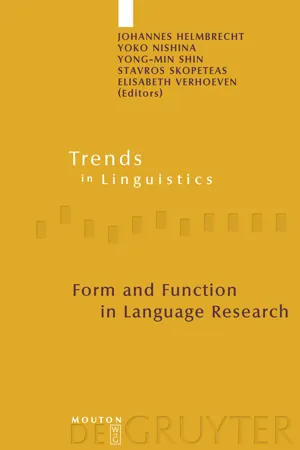
Form and Function in Language Research
Papers in Honour of Christian Lehmann
- 362 pages
- English
- PDF
- Available on iOS & Android
Form and Function in Language Research
Papers in Honour of Christian Lehmann
About this book
Language description enriches linguistic theory and linguistic theory sharpens language description. Based on evidence from the world's languages, functional-typological linguistics has established a number of thorough generalizations about the nature of linguistic categorizations and their manifestation in natural languages. Empirical studies in these fields of linguistics have contributed to sharpen linguistic theory in several respects.
This volume is a collection of 19 contributions from outstanding scholars in the field of functional-typological linguistics that address fundamental issues in the study of language, such as the nature of linguistic categories, the constitution of functional domains, and the form of cross-linguistic continua. Empirical data from individual languages and from typological samples are investigated in order to achieve generalizations about the properties of human grammar(s). Several grammatical phenomena are dealt with including tonal systems, person distinctions, modalities, reciprocity, complex predicates, grammatical relations, word order, clause linkage, and information structure.
The structure of the book illustrates the fundamental importance of the analytical distinction between the onomasiological and the semasiological approach to language and language diversity. Both perspectives are integrated in most papers with a dominant focus on either the former or the latter perspective.
Tools to learn more effectively

Saving Books

Keyword Search

Annotating Text

Listen to it instead
Information
Table of contents
- Frontmatter
- Contents
- Glosses
- Introduction
- The continuum of pragmaticity: a sketch
- Weighing semantic distinctions in person forms
- Spatial reciprocity: between grammar and lexis
- A chapter in marginal possession: on being six(ty) in Europe (and beyond)
- Thoughts on (im)perfective imperatives
- Animacy and argument hierarchy in conflict: constraints on object-topicalization in Korean
- Zero and nothing in Jarawara
- Clause linkage in a language without coordination: the adjoined clause in Iatmul
- Once more on linguistic categories
- Questions surrounding the basic notions of the word, lexie, morpheme, and lexeme
- Linguistic typology and language theory: the various faces of syntax
- Linking without grammatical relations in Yucatec: alignment, extraction, and control
- Areal typology of tone-consonant interaction and implosives in Kwa, Kru, and Southern-Mande
- The internal structure of adpositional phrases
- On the form of complex predicates: toward demystifying serial verbs
- Conjunctive coordination in Amharic: some typological approaches
- Linguistic type and complexity: some remarks
- Constituent questions and argument-focus constructions: some data from the North-Caucasian languages
- “A lot of grammar with a good portion of lexicon”: towards a typology of partitive and pseudopartitive nominal constructions
- Backmatter
Frequently asked questions
- Essential is ideal for learners and professionals who enjoy exploring a wide range of subjects. Access the Essential Library with 800,000+ trusted titles and best-sellers across business, personal growth, and the humanities. Includes unlimited reading time and Standard Read Aloud voice.
- Complete: Perfect for advanced learners and researchers needing full, unrestricted access. Unlock 1.4M+ books across hundreds of subjects, including academic and specialized titles. The Complete Plan also includes advanced features like Premium Read Aloud and Research Assistant.
Please note we cannot support devices running on iOS 13 and Android 7 or earlier. Learn more about using the app